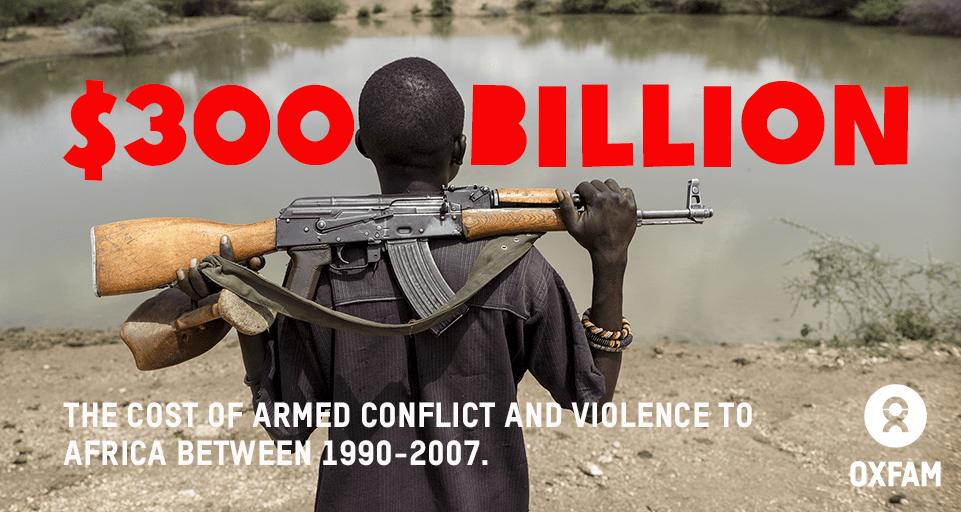
By Pan-Africa Rights in Crisis Campaign Manager, Omayma Gutbi.
Today is an important milestone in Oxfam’s campaign to control arms and save lives in Africa. The first Conference of States Parties (CSP1) of the Arms Trade Treaty (ATT) opens in Mexico, 12 years after Oxfam helped launched the Control Arms coalition to campaign for the treaty.
Now Oxfam, working as part of a large delegation of Control Arms member groups, is at CSP1 pressing for the most robust treaty implementation.
Irresponsible and illegal arms deals continue to fuel conflict in Africa. In past decades armed violence and conflict have been responsible for millions of deaths in Africa. Moreover, past Oxfam research has shown that — compared to peaceful countries — African countries in conflict have on average:
- 50% more infant deaths
- 15% more undernourished people
- life expectancy reduced by five years
- 20% more adult illiteracy
- 2.5 times fewer doctors per patient
- and 12.4% less food per person
This terrible toll has underlined the need for action to control the flow of arms into the continent and their transfer — often by traffickers — within the continent. Ending the irresponsible and illicit arms trade is the goal of the ATT, and as part of the Control Arms coalition, Oxfam has campaigned long and hard for the negotiation of the ATT. We were delighted when, in December 2014, it had the fastest entry into force of any arms control treaty ever.
This shows there is political will to shine a light on the global arms trade, and effectively control it to reduce the misery and death caused by conflict and armed violence.
The job at the first ATT Conference is to make sure the treaty will meet its goals. The conference must set rules for reporting of arms transfers, and transparency of those reports. Public reporting is essential for governments and civil society to be certain that the rules governing the arms trade are being robustly applied. Setting the working methods of future conferences will also be vital if civil society and governments are to cooperate for the best implementation of the ATT possible.
Oxfam, together with Control Arms, will hold a side event during the Conference with civil society and diplomats to emphasise how important the ATT is for Africa, and to discuss these vital issues of treaty implementation. Nowhere do the rules for treaty operation matter more, and nowhere will effective implementation of the treaty save more lives and allow stronger socio-economic development, than Africa.
How do we make a real difference in Africa from a conference room in Mexico? The prevention of arms flows into conflict areas reduces the intensity of the conflict.
Possibly the single most important factor in reducing civilian harm is to reduce the ammunition available to combatants; forcing them to take great care with the ammunition they possess. Conversely, unrestricted arms flows fuel conflict, as can be seen in many different countries across the continent. This will be achievable if the rules governing the treaty provide transparency and strict accountability for the arms trade.
When I return home to Africa from Mexico I will continue to press this point. In particular, I will work together with my colleagues in the Control Arms network in Africa, to encourage African governments to sign up to the treaty where, unfortunately, membership remains low. We also need to ensure that those countries which have signed the treaty implement it robustly; putting in place the best import and export controls possible, and getting the support and assistance they need to do that.
Together, civil society and governments can cut the flows of arms, reduce conflict and build a safer Africa.